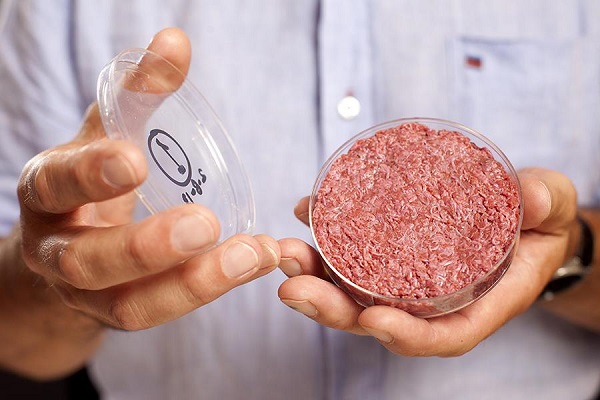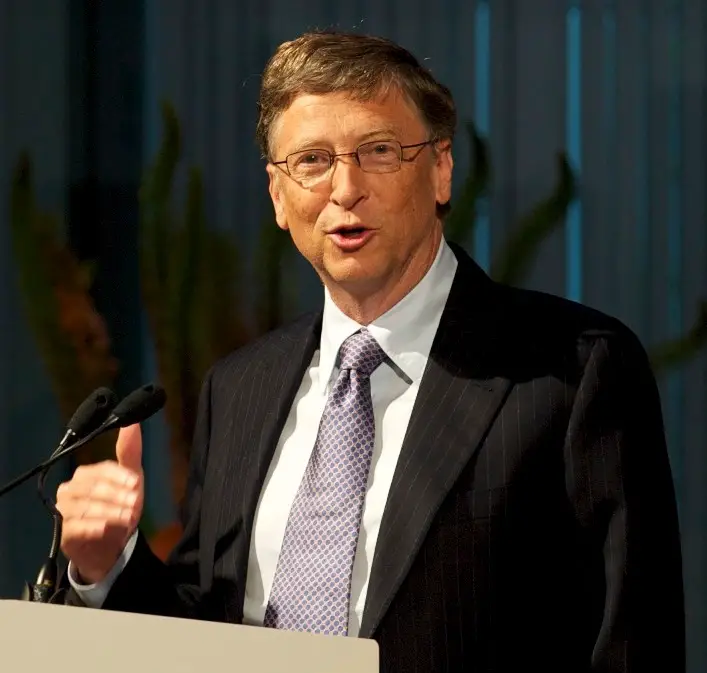
Credit: David Parry, PA Wire
Meat grown in labs has been a hot topic of conversation for the last seven years, with some media outlets hailing it as the future of food and a “cleaner” way to do meat.
But when the real thing hits supermarket shelves, will customers be kept in the dark about how it’s really made, and perhaps more importantly, will anybody actually want to eat it?
Ready or not, lab-grown meat from stem cells is on its way, and it’s being propped up by one of the most controversial names in the world of genetically modified food (GMOs) — Microsoft founder and long-time Monsanto supporter Bill Gates, along with another wealthy investor, Sir Richard Branson, founder of the Virgin Group.
In recent years, the two famous figures placed a big-time bet on the self-proclaimed “clean” lab-grown meat company Memphis Meats, to the tune of $17 million.
But will customers flock to this new so-called “murder free” meat, or are Gates and Branson making a mistake in betting on a an under-tested technology with big claims and unknown effects on human health?
Startup Companies to Grow Meat in the Lab
Memphis Meats and Hampton Creek (recently accused of labeling lies with its other products aimed at reducing animal agriculture) are the most commonly-heard of, but not the only companies who are working on creating lab-grown meat.
MosaMeat of the Netherlands, founded by Professor Mark Post, first started with a product with a $325,000 price tag. Since then, “cultured meat” has become much more affordable — but has continued to avoid conversations on whether these products are actually healthy or not, and whether consumers will know if they have been made with GMO ingredients or not.
Another company is SuperMeat in Israel. Also founded by a professor, its goal is to create lab-grown chicken meat. The company raised $229,269 on Indiegogo to begin its efforts.
These companies are just the tip of the iceberg for what industry insiders hope becomes the new standard for meat eaters everywhere.
Buy pasture-raised beef and chicken here, On Sale Now for 20% Off Today Only!
Further Examining Lab-Grown Meat Promises
All of the lab-grown meat companies have a similar mission, as evidenced by these slogans and promises:
- “A method that doesn’t require raising and slaughtering animals.” – Memphis Meats (now known as Upside Foods)
- “Let’s change the way meat gets to the plate.” – Memphis Meats
- “Eating meat without killing animals.” – SuperMeat
- “Real meat without harming animals.” – SuperMeat
Besides their pledge to save animals, lab-grown meat companies make big claims when it comes to helping the environment.
Upside Foods says they expect the following results from their products:
- An up to 90% reduction in greenhouse gas emissions compared to conventional meat
- The same reduction of land and water use
- Better meat for human health
MosaMeat says they will help solve the food crisis and combat climate change, but doesn’t say much about animal welfare. Their main technique requires one sample of muscle cells to be taken from live animals for every 20,000 tons of lab-grown meat, saying the biopsy is harmless and noting that the animal survives the procedure.
SuperMeat promises to be humane, eco-friendly, to fight world hunger, and to create meat that is supposedly healthier and cheaper.
How the meat is actually grown, however, is another story entirely (and one these companies don’t exactly seem eager to reveal to future customers).
While a humane, environmentally friendly and even “healthy” burger sounds like a dream come true for meat lovers, there are plenty of misconceptions here that the public is being kept in the dark about.
The first issue with lab-grown meat is how the meat cells are being harvested.
Slate recently reported that most lab-grown beef comes from a surprising, and highly unappetizing source — fetal bovine serum (also known as FBS).
Fetal bovine serum is a byproduct made from cow’s fetus blood.
What happens is as follows: if a cow in a slaughterhouse is pregnant, when she is slaughtered, the fetus is removed and brought into a blood collection facility. While still alive, the fetus is drained of its blood until it dies by a process of sticking a needle in its heart. It takes about five minutes, and this is what produces FBS, and ultimately, these so-called healthier burgers.
Even though cows and bulls are kept separately, the percentage of dairy cows who are pregnant is between 17 and 31 percent. As a result the number of fetuses being slaughtered is in the millions.
The FBS from these slaughtered fetuses can then be used in the lab, grown in a petri dish into a meat-like substance by feeding the cells nutrients for about a month. Fetal bovine serum is the easiest to grow, because cells when separated from the body are suicidal. The FBS contains growth factors that prevent them from killing themselves.

Gates

Branson
This process is not the only way to make lab-grown meat, but it is the fastest way. It can be used on other types of meat cells as well, and may be added to a petri dish with chicken cells to create a similar product.
At the end of the day, this reliance on FBS means some animals are still being killed for lab-created meat; cultured meat is definitely not vegetarian as some may hope.
The ethical question of killing animals still remains: is slaughtering fetuses to make this highly unnatural product really any better than killing adult farm animals?
The controversial FBS is also used in creating vaccines for people, and it also comes with about a 1 in 40 billion chance of contracting mad cow disease. This low risk is much higher in cultured meat, which is why the Food and Drug Administration discouraged its use for the past 25 years (before wealthy investors like Gates and Branson decided to bring it to the forefront of the food industry, that is).
Is Lab Grown Meat Really A Better Choice?
What will the cultured meat companies do, and can Gates and Branson steer clear of the controversy that is sure to arise when people find out how these meats are actually made (much like genetically modified organisms from Monsanto)?
Each company ends up hiding its true plans because their products have to be licensed, and there are plenty of proprietary issues that come into play. It seems that they are trying to avoid FBS, but there are no conclusions to be drawn yet.
Hampton Creek says they will try to create meat using plant-based products to make the cells grow using bioreactors or giant tanks, using a process that will look similar to beer brewing.
Upside Foods said they have developed the first product without FBS, and are now working on applying it further.
They are now focusing on lab-grown chicken made from chicken cells, and have had Sir Richard Branson in to test their lab grown products.
It seems as if these companies are all about their image and reputation rather than being fully transparent with their processes, as shown by the vague nature of their new website.
Cultured meat companies are oftentimes mum about the processes they are using. There’s a strong chance these processes will end up using GMO yeast, at least according to a representative from the company Finless Fish as quoted by Gizmodo.
The environmental claims made by lab grown meat companies may not be what they seem, either. Hampton Creek for example says its lab-meat will be up to ten times more environmentally efficient than conventional meat, but the evidence is lacking.
A 2011 study concluded that this type of meat product might produce less greenhouse gas, yet that it uses the same amount of energy as the pork industry. Another 2015 study estimated that it will require the same amount of energy as the conventional meat industry.
Despite the controversies, It seems that many animal rights groups are supporting lab-grown meat.
People for the Ethical Treatment of Animals (PETA) offered a one-million dollar prize to the first company who can produce a commercially successful cultured meat. However, the deadline of the contest has passed as commercial lab-grown meat is still in the works.
It seems that company gave up on inspiring everyone to cut out animal products and is willing to compromise.
“People are surprised to learn that PETA is interested in lab-grown meat, but we have overcome our own revulsion at flesh-eating to champion a breakthrough that will mean a far kinder world for animals,” PETA statement said.
Mercy for Animals also supports “meat that is produced through cellular agriculture instead of slaughter.”
It might not be much better for the environment after all.
Meanwhile, the consumers are being fed an eerily-hypnotizing ads to hype up our expectations.
Watch a TV report about cultured meat that includes laboratory footage:
America’s biggest meat corporation is also jumping on the bandwagon:
Recommended reading:
The Future Is Here: Vegans Can Now Eat a Plant Burger That “Bleeds.” But There Is A Catch…
This article was first written in December 2017 and updated in June 2022.
Buy pasture-raised beef and chicken here, On Sale Now for 20% Off Today Only!
Thanks for installing the Bottom of every post plugin by Corey Salzano. Contact me if you need custom WordPress plugins or website design.




